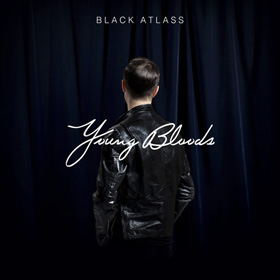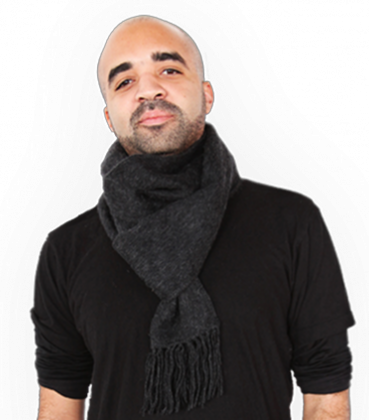Reality Sandwich: William Etundi Interview
Reality Sandwich recently featured a compelling interview with William Etundi, who rose to prominence in the early 2000’s as an NYC-based social activist and party promoter. Etundi now serves as creative director of Artists Wanted, an organization devoted to creating opportunities for artists all around the world.
Daniel Pinchbeck: Tell us a bit about your background. Where are you from?
William Etundi, Jr.: I’m from the Bay Area in Northern California, and Sacramento. My mother is white, Anglo-Saxon Protestant. Like, white, white. And my father is African, from Ghana. They met in college in the seventies, and I was born in 1979 — 32 years old, now. Yeah, I basically grew up in California with my mom. I spent some time during the summers with my dad, who lived in Houston.
My upbringing was very progressive in Northern CA. A degree of “coming of age” happened for me there, mostly in San Francisco, giving me new outlooks and perspective. Specifically, my mom went to seminary and became a Methodist minister when I was nine years old. That’s when I lost religion — when it was taken off the pedestal for me. I began looking at it more deeply and was privy to more theological discussions. I read The Autobiography of Malcolm X when I was eleven, and that changed my life.
She became a liberal, progressive minister? Are Methodists very progressive?
Not in the south. In the west, yes, especially in the Bay area. She interned at a church in the Castro when I was about twelve years old. I spent a lot of time in the Castro district, seeing this culture that I otherwise wouldn’t have been exposed to — this really proud, gay culture, very progressive. It was transformative for me. It taught me the value of gathering for the pure cause of celebration, creating community and identity, as well as the cultural and political opportunities that can stem from that. I moved to New York City when I was eighteen, still holding those ideals, and the rest is history.
Did you go to college here?
Briefly. I’ve been involved with computer programming since an early age. I spent two and a half years in business school studying marketing, and upon the dot com boom I was offered a job as Senior Designer at a major advertising company. I was young, only about twenty years old. See you later, college.
At the same time, you started doing different types of political activism?
Exactly. Actually, I started a bit before that. Around ’97-98 I got involved with Reclaim the Streets, a political movement based around doing these large-scale renegade street parties to raise awareness around different issues, like the local gardens movement.
Once, we took over Avenue A between 7th and 6th Street. [Mayor] Giuliani was about to bulldoze these community gardens that were pretty much the only parks the locals had. Children had been raised there, picnics happened all the time, people got married, and, you know, poor people who didn’t have any other place to go often stayed there. The last low-income people remaining in those zones really gathered around this community of gardens.
We erected two huge tripods, and I was up on one of them. There were two on each end of the street, we blocked the streets with these constructs that the police couldn’t undo. There was a marching band, and it was a complete celebration. The idea was to create a political moment that was engaging and enticing rather than alienating. We had signs stating, We Will Celebrate Until We Win. There were gardens literally being planted in the middle of the street.
Eventually, they started shaking the poles and we came down and got arrested. I spent the night in jail. It was my first arrest in New York City.
What happened with that movement?
The movement continued for a while. Giuliani was giving away these parcels of land to developers who also happened to be his big campaign contributors — people like Richard Singer and Michael Capaldo. But the judges in New York City are more progressive, and they saw what was going on.
There was a big battle over one garden in particular, over on 7th Street, called Esperanza, which means “the garden of hope.” We were battling this whole build out for an entire year. People slept in the garden every night to watch for bulldozers. It was this really beautiful, long-protected thing. We had gatherings around a fire pit every day. None of it was “protest,” it was just basic community.
Eventually, hundreds of people got involved in this. The bulldozers finally came at around five o’clock in the morning, one day. It was on the exact day the judge was supposed to hear the trial discussing some legal things that would potentially save the gardens. Bulldozers show up, and the calls go out. Everyone mobilizes within a couple hours, and the garden fills up with hundreds of people.
It turned into an immense, five-hour battle. Police tried cutting people out. Bulldozers were literally going through, tearing down trees that people were actually in — full on fucking street battle. By the time the judge heard the case the garden was destroyed.
But the judge heard about what was going on in the streets. She was so upset that they went ahead and acted before she had a chance to hear the case that she put a moratorium on any development on any of these disputed lots. It ended up saving about two hundred other community gardens.
There were additional donations from people like Barbara Streisand, and other celebrities started getting involved. A lot of gardens ended up being preserved, actually . . .
Read the rest of the interview at Reality Sandwich
A shout out to Krunk Pony for the heads up on this article.








